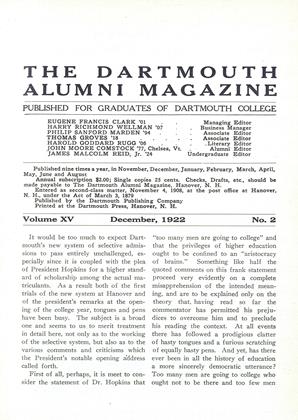"The fundamental need of the world today is leaders trained in a spirit of international broadmindedness," stated President Ernest Martin Hopkins in an informal address before the Pi Delta Epsilon, journalistic fraternity, recently.
"I will feel that I have accomplished a worthy goal if 50 men of the graduating class of Dartmouth College every year enter upon their careers with the earnest desire to advance this principle," continued President Hopkins. "Through personal contact in Europe this summer I was greatly impressed by the theory of nationalism which menaced friendly international relations. The theory of 'My country, right or wrong' was prevalent everywhere.
"But at the same time one cannot refrain from exhibiting a deep sense of sympathy with the people of Europe. 'France is desolate,' to quote the Hatement of a man high in the affairs of the republic. She no longer has the friendship of England; Germany still is her bitter enemy; and the United States has refused even to lend her moral support.
"England, too, is in pitiful state. It was an act of the utmost courage to send her fleet through the Dardanelles in defiance of the Turks and thereby risk the loss of her colonies who profess the Moslem faith. England is absolutely dependent on her colonies for her food supply.
"Militarism in France is a source of continual discontent in England and this feeling is based upon perfectly logical reasoning. An editor of one of the London dailies summarized the situation, 'We will be fools no longer. Germany stated that her military machine was organized for defensive purposes alone. And for 50 years prior to 1914 we complacently rested secure in that belief. Is it not possible that a like situation may develop in France?' But from the French point of view the standing army of 750,000 men is necessary to protect her from hostile countries. It is indeed a complex question.
"Germany presents more difficulties. France desires that Germany pay her war reparations but at the same time would so restrict her foreign trade that it is technically impossible for her to do this. Uhere are three classes in Germany at the present time. The wealthy have invested their capital in foreign countries and are realizing fair returns. The landowners can live upon their products regardless of price changes but the great middleclass of professional and salaried men are in a sad position, pinched between both of these groups."
President Hopkins explained further how the tax rates in Germany were lower than the United States, England and France and how this fact alone caused considerable feeling in France. But the leaders in Germany know that a rise in the tax rates will cause a revolution in Germany. This is but one of the countless questions which are facing the world at the present time.
"Every American who travelled in Europe this summer has presented some theory for the settlement of the entire difficulty," the president continued. "In this respect I feel distinctive for I have none to offer. I can only repeat that a spirit of friendly international relations must be established as a foundation for the settlement of international difficulties."
 View Full Issue
View Full Issue
More From This Issue
-
 Article
ArticleTEACHING SCHOOL
December 1922 By EDWIN JULIUS BARTLETT '72 -
 Article
ArticleNEWSPAPERS CONTINUE DISCUSSION OF PRESIDENT'S ADDRESS
December 1922 -
 Sports
SportsFOOTBALL
December 1922 -
 Article
ArticleIt would be too much to expect Dartmouth's new system
December 1922 -
 Class Notes
Class NotesCLASS OF 1911
December 1922 By Nathaniel G. Burleigh -
 Class Notes
Class NotesCLASS OF 1919
December 1922 By John H. Chipman
Article
-
 Article
ArticleATHLETIC MANAGERSHIPS
August 1921 -
 Article
ArticleALUMNI ASSOCIATION MEETS
AUGUST, 1928 -
 Article
ArticleHanover, New Hampshire $95,000
APRIL 1989 -
 Article
ArticleFraternities Should Be Banned
MARCH 1992 -
 Article
ArticleCross Country
October 1961 By DAVE ORR '57 -
 Article
ArticleThat Men May Understand
January 1941 By HAROLD ORDWAY RUGG '08


